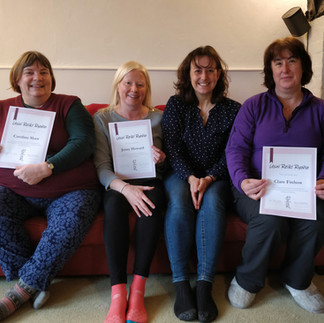Thinking about learning Reiki in 2025? Here are my 5 top tips to find the right teacher for you so you can pursue your Reiki journey with confidence.
1) Do some research rather than go for the first one you meet. Reiki teachers can seem extremely appealing. If we have done a lot of our own inner work we'll be energetic and vibrant, which may seem unfamiliar, but we're also human - we're definitely not perfect! Don't get confused with someone that speaks in flowery language, makes unsustainable promises and appears too good to be true. Also avoid anyone that puts you under pressure to buy, this is your decision, you make it when you are ready - not the other way around. If it's important to you check to see if they are part of an external accreditation group or governing body - I am a member of the Association For Coaching and am thus governed by their ethics. Find out if they are still undergoing ongoing learning and training and whether they have a teacher of their own. My teacher, a Reiki teacher himself for many years, still has a teacher. All good Reiki teachers will have ongoing learning of some form.
2) Decide what flavour of Reiki you would like to learn. There's Angelic, Western, Jikiden, Traditional Japanese and others I am less familiar with. Each one has a different take on the original teachings with some bearing minimal resemblance to what was originally taught. To start with I learnt Western Reiki because that was the teacher I found and I liked him. He later went on to learn Jikiden, which he loved, whilst I later went on to learn traditional Japanese Reiki, which I love. I now teach the traditional Japanese teachings as there is a significantly shorter lineage back to the founder, gives students much more to play with, honours Japanese culture and has in my opinion a significantly better foundation. This means I teach a lot more meditation, I teach the three diamonds instead of chakras and we learn and practice the kotodama much earlier in the Reiki journey. I still have my western Reiki knowledge and I've kept from it the bits I like, whilst letting a lot of the more recent additions to Western Reiki go. The picture shows my certificates from both my Western training and my traditional Japanese course.
3) Try before you buy! Book a treatment with the teacher you would like to learn with and ask yourself a number of questions as you are going through the process:
- do I feel safe with this person?
- do they listen to my needs and respond in an appropriate manner?
- how available are they after a session should I have a problem?
- what facilities do they have?
- how many clients do they see/how much experience do they have?
- do they have knowledge in my particular area of interest? E.g. maternity, health, elderly, trauma, neurodiversity?
- what are they like during the session? Do I like them?
- who's agenda (if any) are they operating on?
- are they calm and open-minded or judgemental and opinionated?
- do they tell me what to do, or give me suggestions if asked to learn more information to help myself?
- how did I feel after the treatment? Were healing reactions explained and did they follow up the following day to check I was ok or if I had any questions?
Reiki is a very personal journey and can be a long one too. A teacher that makes you feel safe, respected, inspired and supported is a great combination.
4) When it comes to the course, is it online or in-person? I personally would only ever teach in person as for me online just can't deliver the same level of learning. Is it one day or two? Whilst teachers I respect teach over one day I like to teach over 2 days for my courses as it allows time for chat, plenty of practice and the gap between day 1 and day 2 gives students the chance to come back with questions.
Whilst it might be tempting to get the training over and done with, ask yourself what drew you to this practice on the first place to inform your decisions moving forwards.
5) Pay a good rate. Whilst it might be attractive to do a cheap or free course, this is a valuable life skill that has the power to transform your whole perspective, improve your confidence, relationships, health and sense of purpose and wellbeing so long as you put the time and commitment to put the practice in. This means your Reiki training is worth investing in. You'd pay to learn/get better at sport, art, music, languages and qualifications for your job so I recommend you value your spiritual development (the very foundation of your existence) as much. Yes, some teachers have an income from elsewhere and don't need to charge, but ask yourself if you'll value the learning as much if it is free? We tend to value things more if we have to match our teachers energetic investment. Plus some teachers like myself offer ongoing support as part of the course fee, which is also very valuable. This includes things like Reiki Shares, ongoing training days and blogs to expand knowledge. Many teachers offer payment plans if it helps spread the load and the knowledge could save you money in the long run.
I trust the above pointers are useful. Did I miss any? Is there anything else you would like to know?






Comments